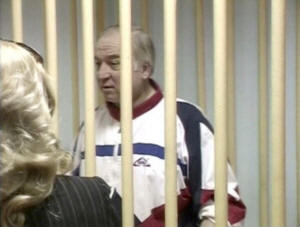|
Unidentified substance leaves ex-Russian
double agent and daughter ill in Britain
 Send a link to a friend
Send a link to a friend
 [March 06, 2018]
By Toby Melville and Emily G Roe [March 06, 2018]
By Toby Melville and Emily G Roe
SALISBURY, England (Reuters) - British
police raced on Tuesday to identify the substance suspected of striking
down a former Russian double agent convicted of treason in Moscow for
betraying dozens of spies to British intelligence.
Mark Rowley, Britain's top counter-terrorism officer, said investigators
needed to be "alive to the fact of state threats" after Sergei Skripal,
once a colonel in Russia's GRU military intelligence service, was taken
ill.
The 66-year-old former spy and his 33-year-old daughter, Yulia, were
found on Sunday unconscious on a bench outside a shopping center in the
English city of Salisbury after exposure to what police said was an
unknown substance.
Both were still critically ill in intensive care, nearly 48 hours after
emergency services were first called.
"They are currently being treated for suspected exposure to an unknown
substance," Wiltshire Police said in a statement. "Both remain in a
critical condition in intensive care."

While the British authorities said there was no known risk to the
public, police sealed off the area where the former spy was found, a
pizza restaurant called Zizzi and the Bishop's Mill pub in the center of
Salisbury.
Some investigators at one point wore yellow chemical suits, though most
police at the scene did not.
Skripal, who passed the identity of dozens of spies to the MI6 foreign
intelligence agency, was given refuge in Britain after he was exchanged
in 2010 for Russian spies caught in the West as part of a Cold War-style
spy swap at Vienna airport.
"We have to remember: Russian exiles aren't immortal, they do all die
and there can be a tendency to conspiracy theories," Rowley told BBC
radio. "But likewise we have to be alive to the fact of state threats,"
he added, pointing to the murder of Alexander Litvinenko.
RUSSIAN DOUBLE AGENT
A British inquiry said President Vladimir Putin probably approved the
2006 murder of ex-KGB agent Litvinenko with radioactive polonium-210 in
London. The Kremlin has repeatedly denied any involvement in the killing
of Litvinenko.
Litvinenko, 43, an outspoken critic of Putin who fled Russia for Britain
six years before he was poisoned, died after drinking green tea laced
with the rare and very potent radioactive isotope at Londonís Millennium
Hotel.
It took some time for British doctors to discern the cause of
Litvinenko's illness.
Should there be any Russian involvement in the Skripal incident, it
would have grave consequences for relations with Moscow, according to
Richard Walton, the former head of Londonís Counter Terrorism Command
who was involved in the Litvinenko investigation.
"The UK cannot and will not tolerate state-sponsored terrorism of any
kind," Walton told reporters.
British police did not release the names of those who were being treated
but two sources close to the investigation told Reuters that the
critically ill man was Skripal.
The BBC, which first reported Skripal's name, said his daughter Yulia
was the 33-year-old woman found beside him.

The Kremlin said it was ready to cooperate if Britain asks it for help
investigating the incident with Skripal.
Calling it a "tragic situation," Kremlin spokesman Dmitry Peskov said
the Kremlin did not have information about the incident.
Asked to respond to British media speculation that Russia had poisoned
Skripal, Peskov said: "It didn't take them long."
[to top of second column]
|

A still image taken from video shows Sergei Skripal, a former
colonel of Russia's GRU military intelligence service, attending a
hearing at the Moscow military district court, Russia August 9 2006.
RTR/via Reuters TV

Russiaís foreign spy service, known as the SVR, said it had no
comment to make. Russiaís foreign ministry, and the Russian
counter-intelligence service, the FSB, did not immediately respond
to questions submitted by Reuters about the case.
MOSCOW TO SALISBURY
Skripal was arrested in 2004 by Russia's Federal Security Service
(FSB) on suspicion of betraying dozens of Russian agents to British
intelligence. He was sentenced to 13 years in prison in 2006 after a
secret trial.
Skripal, who was at the time shown wearing a track suit in a cage in
court during the sentencing, had admitted betraying agents to MI6 in
return for money, some of it paid into a Spanish bank account,
Russian media said at the time.
But he was pardoned in 2010 by then-President Dmitry Medvedev as
part of a swap to bring 10 Russian agents held in the United States
back to Moscow.
The swap, one of the biggest since the Cold War ended in 1991, took
place on the tarmac of Vienna airport where a Russian and a U.S. jet
parked side by side before the agents were exchanged.
One of the Russian spies exchanged for Skripal was Anna Chapman. She
was one of 10 who tried to blend in to American society in an
apparent bid to get close to power brokers and learn secrets. They
were arrested by the FBI in 2010.
The returning spies were greeted as heroes in Moscow. Putin, himself
a former KGB officer, sang patriotic songs with them.

Skripal, though, was cast as a traitor by Moscow. He is thought to
have done serious damage to Russian spy networks in Britain and
Europe.
The GRU spy service, created in 1918 under revolutionary leader Leon
Trotsky, is controlled by the military general staff and reports
directly to the president. It has spies spread across the world.
Since emerging from the John le Carre world of high espionage and
betrayal, Skripal lived modestly in Salisbury and kept out of the
spotlight until he was found unconscious on Sunday at 1615 GMT.
Wiltshire police said a small number of emergency services personnel
were examined immediately after the incident and all but one have
been released from hospital.
The Sun newspaper said Skripal's wife was killed in a car accident
shortly after her arrival in Britain. His son was killed in a car
accident in Russia.
A white and yellow police forensics tent covered the bench where
Skripal was taken ill.
(Reporting by Toby Melville; Writing by Guy Faulconbridge;
Additional reporting by Alistair Smout, William Schomberg, Andy
Bruce and Michael Holden in LONDON, Andrew Osborn, Polina Nikolskaya
and Margarita Popova in MOSCOW and Mark Hosenball in WASHINGTON;
Editing by Raissa Kasolowsky/Mark Heinrich)
[© 2018 Thomson Reuters. All rights
reserved.]
Copyright 2018 Reuters. All rights reserved. This material may not be published,
broadcast, rewritten or redistributed.
Thompson Reuters is solely responsible for this content.
 |